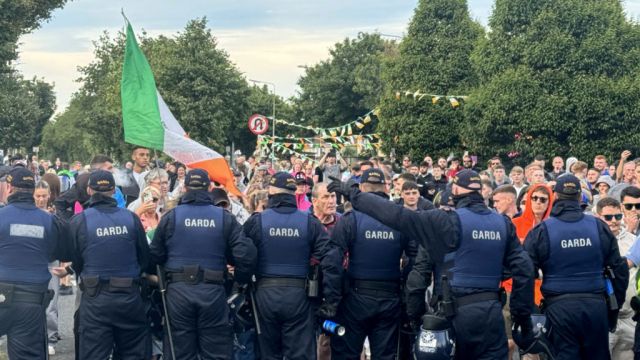Tánaiste Micheál Martin has said that he was “uncomfortable” with what he saw on RTÉ Investigates on Thursday night with the State needing to “learn lessons” in relation to events which transpired in Coolock in Dublin last July when an anti-immigration protest descended into rioting.
For the past six months, journalist Barry O’Kelly of RTÉ Investigates has been filming at protests against accommodation for migrants.
The programme captured the moment on July 15th last when a security officer at the former Crown Paints site in Coolock was knocked unconscious when he was hit by a pole. It also showed the throwing of a petrol bomb and the abuse of construction workers by anti-immigrant protestors.
Speaking in Cork, Micheál Martin said in the first instance, he wanted to pay tribute to the team at RTÉ Investigates, and in particular Barry O’Kelly, who put himself in “harm’s way” to shed a light on a ‘very dangerous trend” now developing in Ireland.
“People are taking the law into their own hands, intimidating ordinary workers going about their daily jobs, intimidating, harassing and committing violent acts against migrants and against people more generally.”
The Tánaiste condemned the appalling scenes filmed by RTÉ Investigates and said we need to examine what occurred to see what can be learned from it.
“I think the State does need to learn lessons from what happened in Coolock. I watched it (RTÉ Investigates) last evening. I was uncomfortable with what I saw. I know the gardaí have issued very strong statements accounting for what transpired over those few days. And overall about 200 gardaí were involved.
"But this is a relatively new phenomenon in Ireland in terms of the degree to which people think they can take control of given environments — or indeed the degree to which they think they can take the law into their own hands.
"I think, yes there are certainly lessons to be learned. And we do need to reflect on whether our criminal justice system needs review in terms of combatting the type of behaviour we saw on RTÉ Investigates last evening.”
Mr Martin wouldn’t be drawn on whether the garda response to the Coolock was inadequate as suggested by some persons in the documentary. However, he admitted that the days of what we consider to be “a traditional garda response” were over.
“I think there are certainly lessons to be learned from it. There was period of time there when the workers in the facility had been ringing (gardaí) consistently. It looked very ominous. It looked very dangerous and threatening. The gardaí did get there. And I think we need to learn lessons from it.
"When you look at what happened in the United Kingdom where there was a very rapid response to rioting recently where people were before the courts within days and some jailed within a week, I think we could learn lessons from that.
"I think the days of sort of what we might consider a traditional response are over. And I think we cannot accept people taking the law into their own hands in the pre-determined way.”
Mr Martin said that the persons responsible for what occurred at Coolock were not getting away with what they did.
“To be fair, there have been quite a number of significant arrests arising out of that incident. A report was presented to the Policing Authority in respect of that and quite a number of people are still before the courts. So people are not getting away with what they did.
"In my view, we need to review the adequacy of our approach and of our criminal justice system to events of this kind and to the type of behaviour that we are witnessing more and more on our streets where certain people of a certain persuasion seem to think that they control what happens in given areas. That cannot be allowed to continue.”
The Tánaiste said that the behaviour shown in the programme was “foreign” to most people in this country.
“We don’t believe in that type of behaviour. We never have. We believe in the rule of law. We believe in people being able to go about their daily duties.
"I was appalled at the intimidation aimed at RTE. Particularly Barry O’Kelly throughout various episodes of the programme last night.
"Democracy depends on media being in the position to go about its business.
"There can be no tolerance for any interference with the media. They should be allowed to go about their job unhindered and threats and intimidation of Barry O'Kelly and camera people (as seen on the programme) yesterday evening is a threat to our democracy. Let us be very clear about that.”
Mr Martin said that the Garda Commissioner was responsible for operational responses, and that judgement calls had to be made on a case by case basis.
He added that the onus is on us a country to reflect on where all the hate is coming from. Mr Martin accepted the need for proper consultation with communities prior to the opening of accommodation facilities for persons seeking asylum in this country.
“We do have to reflect also the terms of hate, vile commentary that was on evidence. Where is all that coming from? Very irrational disproportionate responses and it is a matter of grave concern.
"Consultation is important. Proper engagement is important. We need to listen to local communities more and engage with local communities more in respect of these issues.
"All Governments across Europe are under enormous pressure because of the pressure of migration itself which has been weaponised by bad authoritarian states, namely Russia. Conflict and war in Africa and the Middle East all of which is creating enormous pressure on Europe in particular and other areas.
"That is the global reality we live. Yes, consultation should occur. We do have to learn lessons on that front also.”







